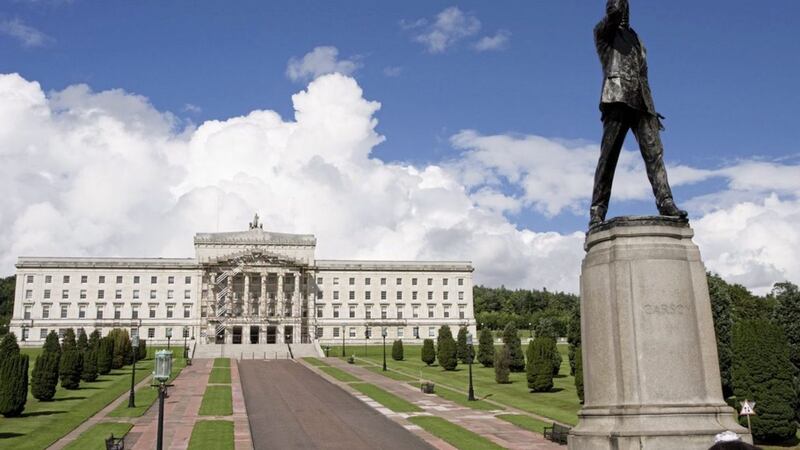All hail our new first minister - or at any rate, our de facto first minister (dfFM?) David Sterling, permanent secretary at the department of finance, is now in charge of Stormont spending. While he is ultimately constrained to 95 per cent of last year’s budget, he has full lawful authority within that limit to decide where the money goes. The 5 per cent axe is falling first on the community and voluntary sector, as outsourced public services are cut. Even the hundreds of people losing their jobs seem to feel this is inevitable, because Sterling is a mere civil servant who must be as apolitical as possible. But why is cutting outsourced services less ‘political’ than laying off Stormont bureaucrats, for example? Sterling was the official in charge when the Renewable Heat Incentive scheme was set up, so is likely to be summoned to the RHI inquiry while running Northern Ireland. This is the reason Sinn Féin says Arlene Foster cannot be first minister, so all that seems to have achieved is replacing an elected FM with an unelected dfFM.
**
How can the DUP have a “longstanding policy” of not negotiating on Sundays, yet also claim its “leadership was available for talks” last Sunday? Whatever way this circle is squared, it did not stop the DUP attending the last day of 2013’s Haass talks, which ran from 10am on a Sunday until 5am the following morning. Failing to show up last Sunday provided Gerry Adams with the perfect pretext to scupper the latest talks one day before their final deadline. This avoided the theatrics of not nominating a deputy first minister in the assembly - and how interesting that Sinn Féin must have judged such scenes to be not to its advantage. A crisis usually needs a bit of drama. The resulting cancellation of Monday’s assembly session also scuppered the nomination of SDLP MLA Patsy McGlone as speaker. Adams will not have minded that at all.
**
Sinn Féin claims that most of its talks demands are simply “outstanding commitments” from previous agreements. In most cases this claim is debatable, none more so than in the case of restoring the Civic Forum - a demand now also made by Fianna Fail leader Micheal Martin. The Civic Forum was established as required by the Good Friday Agreement. It was superseded by the Civic Advisory Panel, created by the Fresh Start agreement. This panel was appointed last December by Arlene Foster and Martin McGuinness in one of the last acts of the Executive Office - making it one of Fresh Start’s most clearly delivered commitments.
**
Responding to the triggering of Article 50, the European Parliament has drafted a resolution on the “absolute need” to avoid a hard border or any other consequences of Brexit that might damage the peace process. This makes a special deal for the island of Ireland almost certain. However, the reasoning behind it is a double-edged sword. The resolution claims the EU “actively brokered” the Good Friday Agreement, which is demonstrably untrue, and infers that “parts” of the agreement will be affected by EU withdrawal, which the UK Supreme Court has found to be totally groundless. If believing otherwise inclines Brussels to be helpful, perhaps we should leave them to it. However, if this starts making us believe the agreement has been breached, that could do the very damage to the peace process Brussels fears.
**
In more Article 50 fallout, UK Brexit secretary David Davis has said Northern Ireland can rejoin the EU by voting for Irish unity, specifying this would mean joining the Republic - an existing and continuing EU state - rather than creating a new country that would have to reapply for membership. To an extent, Davis was only underscoring what has been obvious for some time - the Taoiseach has been saying the same for almost a year. But this poses a growing rhetorical challenge to the many republicans who feel a united Ireland must be a new country. This challenge is hardly insurmountable - the Republic could make significant symbolic and constitutional changes without invalidating its EU warranty. But what should they be, and how does this new conception of unity affect them?
**
Further details have emerged of construction flaws throughout the Royal Victoria Hospital’s £150m critical care unit, opened three years late in 2015 and still with only the first two of its 12 storeys in use. On the roof is the Royal’s only helipad, which the Belfast Trust has always gnomically declared to be unsuitable for an air ambulance. Now we presumably know why.
**
People Before Profit leader Eamonn McCann has been philosophical about his brief Stormont career, saying “it wasn’t me”. Decades of making lengthy speeches at rallies and meetings turned out to be poor preparation for addressing the assembly, where members must be concise and give ways to others. However, the worst problem with McCann’s oration was that he kept whacking the chamber’s microphones as he waved his arms around with socialist enthusiasm. This often made it impossible to broadcast clips of his statements - a lethal blow to a modern politician.
newton@irishnews.com









